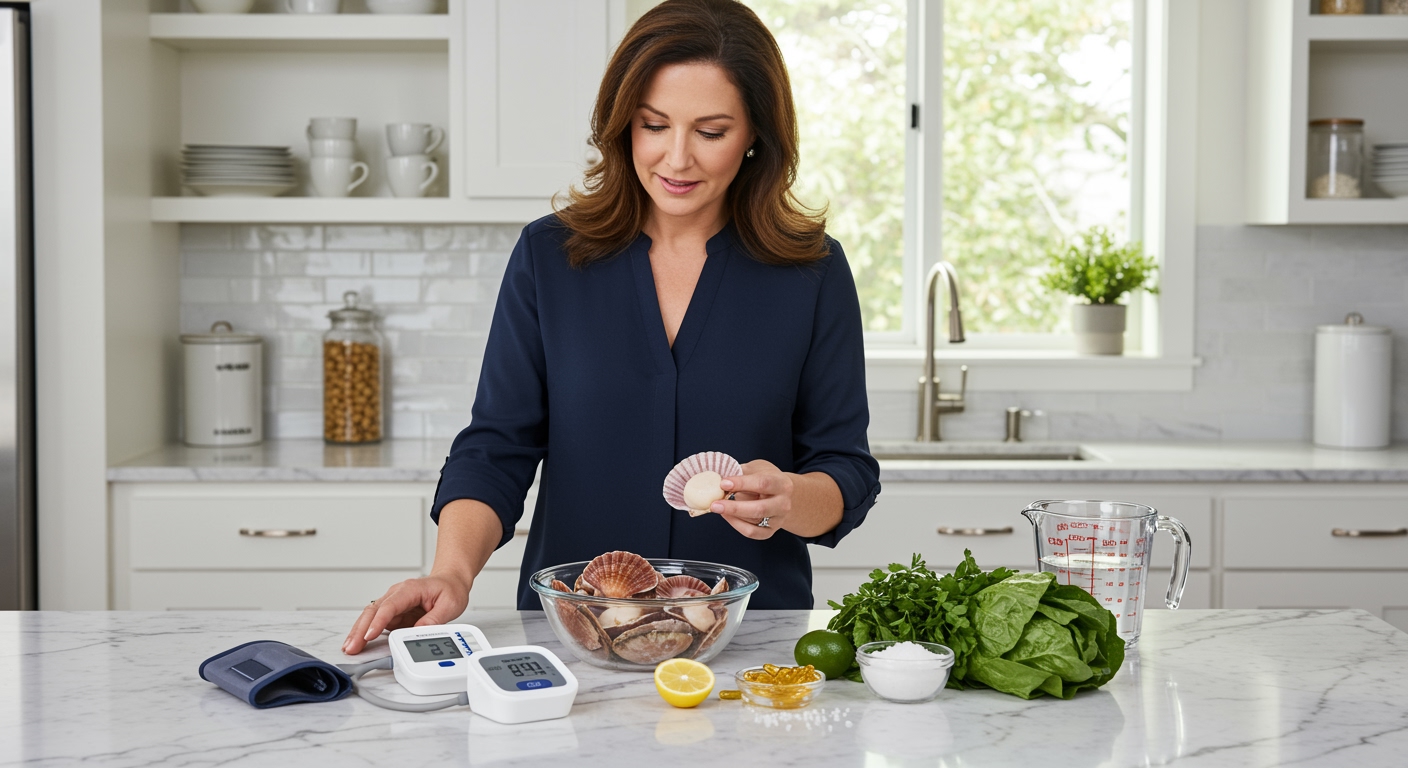✪ Key Takeaway: Scallops can help stabilize blood pressure through omega-3 fatty acids and potassium content.
Introduction
Your doctor just told you to watch your blood pressure, and now you are staring at your dinner plate wondering what foods can actually help.
You might be asking this question because you love seafood but want to make sure your choices support your cardiovascular health instead of working against it.
Hi, I am Abdur, your nutrition coach, and today I am going to explain exactly how scallops can help stabilize your blood pressure and what makes them different from other seafood options.
What Makes Scallops Special for Blood Pressure?
Scallops contain a unique combination of nutrients that work together to support healthy blood pressure levels.
The most important component is their omega-3 fatty acid content, specifically EPA and DHA.
Research shows that consuming about 3 grams of omega-3 fatty acids daily can help reduce blood pressure by improving blood vessel flexibility.
A 3.5-ounce serving of scallops provides approximately 0.3 grams of omega-3s, which contributes meaningfully to your daily intake.
Scallops also contain potassium, a mineral that helps your kidneys remove excess sodium from your body.
When sodium levels drop, your blood vessels can relax, which naturally lowers pressure on your arterial walls.
✪ Fact: Scallops contain more potassium per serving than many other popular seafood choices.
How Do Omega-3s Actually Lower Blood Pressure?
Omega-3 fatty acids work through multiple pathways in your cardiovascular system.
First, they help produce nitric oxide, a molecule that signals your blood vessels to relax and widen.
When your blood vessels are more flexible, your heart does not have to work as hard to pump blood throughout your body.
Second, omega-3s reduce inflammation in your arterial walls, which prevents them from becoming stiff and narrow.
Chronic inflammation is one of the main drivers of high blood pressure because it damages the delicate lining of your blood vessels.
Third, these fatty acids help regulate your heart rhythm and prevent dangerous irregular beats that can spike your blood pressure.
The EPA and DHA in scallops are the same types found in fish oil supplements, but getting them from whole food sources provides additional benefits like protein and minerals.
✪ Pro Tip: Combine scallops with other omega-3 rich foods throughout the week for maximum blood pressure benefits.
Are There Any Concerns With Eating Scallops?
While scallops offer blood pressure benefits, you need to consider a few important factors.
Scallops are naturally high in sodium, containing about 667 milligrams per 3.5-ounce serving.
This sodium content can work against the blood pressure benefits if you are not careful with your overall daily intake.
However, the potassium content in scallops helps balance this sodium, making them a better choice than many processed foods.
Another concern is preparation methods that add extra sodium, butter, or oil.
Restaurant scallops are often seared in butter and salt, which can significantly increase the sodium content and negate the blood pressure benefits.
Some people also worry about cholesterol, but scallops contain less cholesterol than many other animal proteins and the omega-3s actually help improve your cholesterol profile.
✪ Note: Always rinse scallops before cooking to remove excess sodium from processing.
What Is the Best Way to Prepare Scallops?
The cooking method you choose can either enhance or diminish the blood pressure benefits of scallops.
Grilling or broiling scallops without added salt preserves their natural nutrients while creating delicious flavor.
You can season them with herbs like garlic, rosemary, or thyme, which actually provide additional antioxidants that support cardiovascular health.
Steaming is another excellent option because it requires no added fats and keeps the omega-3 content intact.
Avoid breading and deep-frying, which adds unnecessary calories and can create harmful compounds that increase inflammation.
If you want to sear scallops, use a small amount of olive oil instead of butter to add heart-healthy monounsaturated fats.
Pairing scallops with vegetables like spinach, broccoli, or asparagus creates a complete meal that supports healthy blood pressure from multiple angles.
✪ Pro Tip: Cook scallops just until they turn opaque to preserve maximum nutritional value.
How Often Should You Eat Scallops?
The frequency of scallop consumption depends on your overall diet and health goals.
For most people, eating scallops 2-3 times per week provides meaningful cardiovascular benefits without overdoing the sodium intake.
This frequency allows you to get consistent omega-3 fatty acids while leaving room for other heart-healthy proteins in your diet.
If you have kidney disease or are on a strict sodium restriction, you should limit scallops to once per week or less.
People taking blood pressure medications should monitor their levels more closely when adding scallops to their regular diet.
The cumulative effect of dietary changes can sometimes enhance the effects of medications, which is generally good but requires awareness.
Remember that scallops work best as part of an overall heart-healthy diet that includes plenty of vegetables, whole grains, and other omega-3 rich foods.
✪ Fact: Rotating between different types of seafood provides a wider range of nutrients than eating the same fish repeatedly.
The Bottom Line
Scallops can definitely help stabilize blood pressure when prepared properly and eaten as part of a balanced diet.
The key to lasting health changes lies in consistent, small improvements rather than dramatic dietary overhauls.
I would love to hear about your experience with scallops or any questions you have about incorporating seafood into your blood pressure management plan, so please share your thoughts in the comments below.
References
At NutritionCrown, we use quality and credible sources to ensure our content is accurate and trustworthy. Below are the sources referenced in creating this article:
- American Heart Association: About 3 grams a day of omega-3 fatty acids may lower blood pressure
- Cleveland Heart Lab: Omega-3 Fatty Acids: A Natural Way to Lower Blood Pressure
- PMC: Marine omega-3 fatty acids and blood pressure
- PubMed: Effects of omega-3 fatty acids on blood pressure





